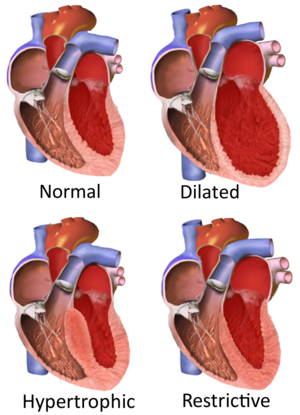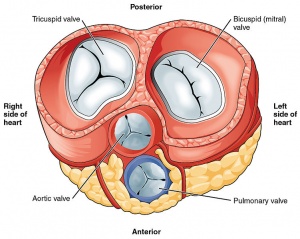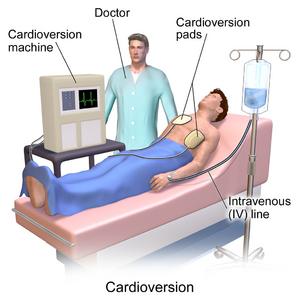Cardiac Conditions and Inheritance: Difference between revisions
No edit summary |
No edit summary |
||
| (9 intermediate revisions by 3 users not shown) | |||
| Line 1: | Line 1: | ||
<div class="editorbox"> | <div class="editorbox"> | ||
'''Original Editor '''- [[User: | '''Original Editor '''- [[User:Lucinda hampton|Lucinda hampton]] | ||
'''Top Contributors''' - {{Special:Contributors/{{FULLPAGENAME}}}} | '''Top Contributors''' - {{Special:Contributors/{{FULLPAGENAME}}}} | ||
</div> | </div> | ||
== Introduction == | == Introduction == | ||
Many different types of [[Anatomy of the Human Heart|heart]] disease can be passed down through families. Inherited cardiac conditions (ICC) is an umbrella term covering a wide variety of relatively rare diseases of the heart. Before 1990 very little was known about gene faults which cause inherited cardiac conditions (ICC). Thanks to medical research there are more than 40 known heart diseases with genetic causes.<ref>ACGT Genetic Heart Disease Available: https://www.heartregistry.org.au/patients-families/genetic-heart-diseases/<nowiki/>(accessed 5.3.2022)</ref> | |||
= | ICCs are caused by a mutation in one or more of our genes. If someone has a faulty gene, there’s a 50/50 chance it can be passed on to the children. These conditions do not always have symptoms, so a person can be unaware they have the conditions, sadly sometimes the first time a family is aware of being affected is after a sudden [[Cardiac Arrest|cardiac arrest]] (SCD).<ref name=":0">NHS ICC Available: https://www.nhsinform.scot/illnesses-and-conditions/heart-and-blood-vessels/conditions/inherited-heart-conditions (accessed 5.3.2022)</ref> | ||
== | == Inheredited Cardiac Conditions == | ||
Examples include: | |||
[[File:Cardiomypoathies.png|thumb|Cardiomypoathies]] | |||
Familial [[cardiomyopathies]] | |||
* Hypertrophic Cardiomyopathy (HCM), a fairly common inherited heart condition that can affect people of any age. This disease can thicken part or all of the heart muscle and in extreme cases, it can cause sudden death | |||
* | * Idiopathic or familial Dilated Cardiomyopathy (DCM), the heart muscle becomes thin and weak. As the muscle stretches, the affected chamber becomes enlarged, making blood pump less efficiently. This can lead to [[Heart Failure|heart failure]] | ||
* | * [[Arrhythmogenic Right Ventricular Cardiomyopathy|Arrhythmogenic right ventricular cardiomyopathy]] (ARVC) | ||
* Restrictive cardiomyopathy. | |||
Familial [[Heart Arrhythmias|arrhythmias]]: Long QT syndrome (LQTS); Brugada syndrome; Catecholaminergic Polymorphic Ventricular Tachycardia (CPVT); Short QT Syndrome (SQTS) | |||
[[File:Heart Valves.jpg|thumb|Heart Valves]] | |||
Bicuspid [[Aortic Valve Disease|aortic valve disease]], the aortic heart valve has only two flaps instead of three, causing it to leak or narrow. | |||
[[Marfan Syndrome|Marfan syndrome]]: damages the connective tissues in the heart and blood vessels, making them more prone to aneurysms | |||
Familial [[Hypercholesterolemia]]: an inherited cause of [[Coronary Artery Disease (CAD)|coronary heart disease]]. If left untreated, it can lead to a [[stroke]] or [[Myocardial Infarction|myocardial infarct]]. | |||
Sudden Arrhythmic Death Syndrome (SADS): a condition which means there was an unexplained underlying familial heart rhythm that was not detected until there was an investigation following a death.<ref name=":0" /><ref>Penn Medicine All in the Family: 3 Common Inherited Heart Diseases Available: https://www.pennmedicine.org/updates/blogs/heart-and-vascular-blog/2019/january/inherited-heart-diseases<nowiki/>(accessed 5.3.2022)</ref> | |||
== Treatment == | |||
[[File:Cardioversion.png|thumb|Cardioversion]] | |||
The ICC treatments may include, but not limited to: | |||
* Lifestyle changes eg weight loss or [[Therapeutic Exercise|exercise]] to help prevent or minimize the effects of heart disease | |||
* Healthy living eg avoiding [[Smoking Cessation and Brief Intervention|smoking]], [[Alcoholism|alcohol]], [[Caffeine and Exercise|caffeine]] and high-fat foods to improve your health | |||
* Medication to help regulate the way the heart works or minimize the chance of blood clots | |||
* Cardiovascular surgery to repair or replace damaged valves, vessels or other parts of the heart. eg [[Coronary Artery Bypass Graft|CABG]] | |||
* [[Cardiac Implantable Electronic Devices (CIEDs)|Implantable]] cardioverter [[Cardioversion|defibrillator]] (ICD), a device that automatically corrects arrhythmia | |||
== Resources == | |||
Inherited heart conditions<ref>https://www.nhsinform.scot/illnesses-and-conditions/heart-and-blood-vessels/conditions/inherited-heart-conditions</ref> | |||
== References == | == References == | ||
<references /> | <references /> | ||
[[Category:Genetic Disorders]] | |||
[[Category:Cardiovascular Disease]] | |||
Latest revision as of 12:25, 30 March 2022
Original Editor - Lucinda hampton
Top Contributors - Lucinda hampton, Tolulope Adeniji and Rucha Gadgil
Introduction[edit | edit source]
Many different types of heart disease can be passed down through families. Inherited cardiac conditions (ICC) is an umbrella term covering a wide variety of relatively rare diseases of the heart. Before 1990 very little was known about gene faults which cause inherited cardiac conditions (ICC). Thanks to medical research there are more than 40 known heart diseases with genetic causes.[1]
ICCs are caused by a mutation in one or more of our genes. If someone has a faulty gene, there’s a 50/50 chance it can be passed on to the children. These conditions do not always have symptoms, so a person can be unaware they have the conditions, sadly sometimes the first time a family is aware of being affected is after a sudden cardiac arrest (SCD).[2]
Inheredited Cardiac Conditions[edit | edit source]
Examples include:
Familial cardiomyopathies
- Hypertrophic Cardiomyopathy (HCM), a fairly common inherited heart condition that can affect people of any age. This disease can thicken part or all of the heart muscle and in extreme cases, it can cause sudden death
- Idiopathic or familial Dilated Cardiomyopathy (DCM), the heart muscle becomes thin and weak. As the muscle stretches, the affected chamber becomes enlarged, making blood pump less efficiently. This can lead to heart failure
- Arrhythmogenic right ventricular cardiomyopathy (ARVC)
- Restrictive cardiomyopathy.
Familial arrhythmias: Long QT syndrome (LQTS); Brugada syndrome; Catecholaminergic Polymorphic Ventricular Tachycardia (CPVT); Short QT Syndrome (SQTS)
Bicuspid aortic valve disease, the aortic heart valve has only two flaps instead of three, causing it to leak or narrow.
Marfan syndrome: damages the connective tissues in the heart and blood vessels, making them more prone to aneurysms
Familial Hypercholesterolemia: an inherited cause of coronary heart disease. If left untreated, it can lead to a stroke or myocardial infarct.
Sudden Arrhythmic Death Syndrome (SADS): a condition which means there was an unexplained underlying familial heart rhythm that was not detected until there was an investigation following a death.[2][3]
Treatment[edit | edit source]
The ICC treatments may include, but not limited to:
- Lifestyle changes eg weight loss or exercise to help prevent or minimize the effects of heart disease
- Healthy living eg avoiding smoking, alcohol, caffeine and high-fat foods to improve your health
- Medication to help regulate the way the heart works or minimize the chance of blood clots
- Cardiovascular surgery to repair or replace damaged valves, vessels or other parts of the heart. eg CABG
- Implantable cardioverter defibrillator (ICD), a device that automatically corrects arrhythmia
Resources[edit | edit source]
Inherited heart conditions[4]
References[edit | edit source]
- ↑ ACGT Genetic Heart Disease Available: https://www.heartregistry.org.au/patients-families/genetic-heart-diseases/(accessed 5.3.2022)
- ↑ 2.0 2.1 NHS ICC Available: https://www.nhsinform.scot/illnesses-and-conditions/heart-and-blood-vessels/conditions/inherited-heart-conditions (accessed 5.3.2022)
- ↑ Penn Medicine All in the Family: 3 Common Inherited Heart Diseases Available: https://www.pennmedicine.org/updates/blogs/heart-and-vascular-blog/2019/january/inherited-heart-diseases(accessed 5.3.2022)
- ↑ https://www.nhsinform.scot/illnesses-and-conditions/heart-and-blood-vessels/conditions/inherited-heart-conditions









